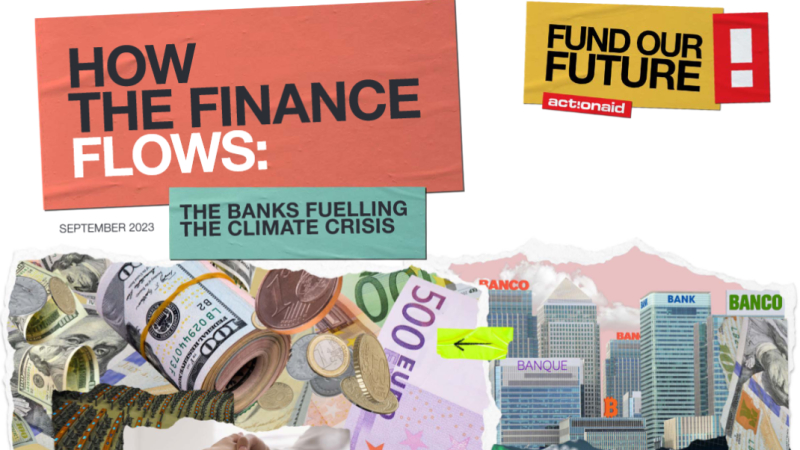The causes fueling the climate crisis are receiving 20 times more financing than the solutions, new groundbreaking report by ActionAid reveals
ActionAid Press Office email media-enquiries@actionaid.org or call +44 7586107955

ActionAid Press Office email media-enquiries@actionaid.org or call +44 7586107955
- Groundbreaking new report shows the fossil fuel and industrial agriculture industries in the Global South are receiving an annual average of 20 times more financing from banks than governments are receiving for climate solutions.
- Banks have put $3.2 trillion towards the expansion of fossil fuels since the Paris Agreement, with $370 billion being funneled into the second major cause of climate change, industrial agriculture.
- Top banks funding the climate crisis include HSBC, Citigroup and JP Morgan Chase.
A new report reveals for the first time that the world’s banks including HSBC, Citigroup and Barclays are channeling, on average, an astounding 20 times more finance into the major causes of climate change than governments in the Global South are receiving as funding for climate solutions.
The report How the Finance Flows: the banks fuelling the climate crisis shows that bank financing provided to the fossil fuel industry in the Global South reached an estimated $3.2 trillion in the seven years since the Paris Agreement on Climate Change was adopted, with $370 billion provided to the largest industrial agriculture companies operating in the Global South.
The report found the top banks from each region funding fossils fuels and industrial agriculture in the Global South were:
- In Europe: HSBC, BNP Paribas, Société Générale, Barclays;
- In the Americas: Citibank, JPMorgan Chase, Bank of America;
- In Asia: Industrial and Commercial Bank of China, China CITIC Bank, Bank of China and Mitsubishi UFJ Financial.
The largest recipient of industrial agriculture financing in the Global South is Bayer which has received an estimated $20.6 billion in financing for its industrial agriculture operations in the Global South since 2016. Bayer – which owns the infamous biotechnology company once known as Monsanto - is the world’s second largest producer of agrochemicals. The fertilisers, pesticides and deforestation associated with Bayer’s products are major contributors to the greenhouse gas emissions that cause climate change.
Arthur Larok, Secretary General at ActionAid International, said: “This report must not be ignored by the banks funding the climate crisis. The world’s money is flowing in the wrong direction – since the Paris Agreement, banks have provided 20 times more financing to fossil fuels and industrial agriculture activities in the Global South than Global North governments have provided as climate finance to countries on the front lines of the climate crisis. This is absurd and must stop.”
Teresa Anderson, Global Lead on Climate Justice at ActionAid International and author of the report, said: “Global banks often make public declarations that they are addressing climate change but the scale of their continued financing of fossil fuels and industrial agriculture is simply staggering. It is communities in Africa, Asia and Latin America who are suffering the impacts of decisions made in distant banking boardrooms. By financing fossil fuel and industrial agriculture in the Global South, banks are condemning communities to the cruel combination of landlessness, deforestation, water pollution and climate change. With this report, banks can no longer pretend that the issue is out of sight, out of mind.
Teresa added: “Banks need to own up to the harm that they are unleashing on the communities and the planet, and urgently stop financing the destruction wreaked by fossil fuels and industrial agriculture.”
This report sets out the alternatives to these harmful practices. Solutions like renewable energy and agroecology are centred on real leadership from women and young people in the Global South, but they must be supported by progressive public financing.
Agroecology describes farming and managing crops, livestock, forests and fisheries in a way that works with nature, avoids emissions, is resilient to climate change and sustainable, and offers various other environmental, social and cultural benefits such as addressing food and water scarcity, and poverty.
Mary Afan, a farmer and the coordinator of the small-scale women farmers in Nigeria, said: “Sustainable solutions like agroecology which would feed the world and keep temperatures low are being undermined by overly funded large multinational industrial agriculture companies.
“Governments and funders must prioritise increasing support and agroecological training for smallholder farmers, and encourage an end to deforestation and overuse of chemicals to produce commodities. Supporting agroecology means we are moving towards funding our future, rather than our destruction.”
The report calls for:
- Banks to immediately stop project and corporate financing for all new deforestation, coal and fossil fuel expansion activities, and rapidly phase out financing of all other fossil fuel and harmful industrial agriculture activities;
- Banks must strengthen polices against human rights abuses and deforestation to protect the rights of communities;
- National and regional governments must regulate the banking and finance sectors to stop the financing of fossil fuel expansion, and scale up support and planning for just transitions to real solutions such as renewable energy and agroecology.
The report How The Finance Flows: the banks fuelling the climate crisis can be downloaded here.
Reposted from the original press release on the ActionAid website here.
